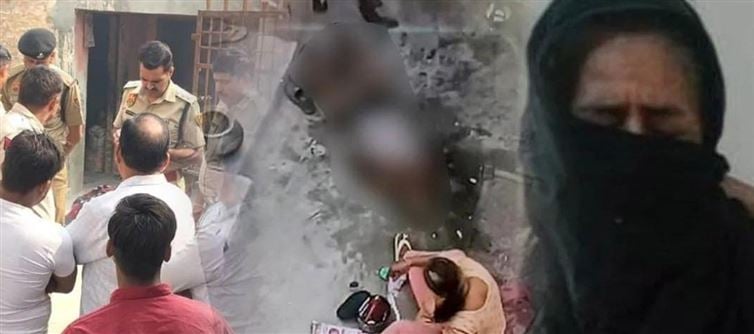
💥 The murder No One Wants to Talk About
In Haryana’s Sonipat, 60-year-old Suresh, frail and unwell, drove a three-wheeler every day to keep his household alive.
He wasn’t a criminal. He wasn’t abusive.
He was simply a man trying to survive poverty.
And yet, he was beaten to death by his own wife, Poonam, because he couldn’t bring home enough money.
After killing him, she didn’t flee. She didn’t cry. She sat next to his corpse and did her makeup.
That’s not just murder.
That’s the kind of psychological rot society refuses to see — because the victim didn’t fit the narrative.
🧍♂️ 1. When the Victim Is a Man, Outrage Goes Missing
If the roles were reversed, this story would’ve lit up every newsroom in India.
You’d see headlines screaming “Another Woman Killed by Patriarchal Violence!”
Politicians would demand justice. Feminist influencers would flood social media.
But because the victim was a man, the silence is deafening.
No panel debates. No protests. No “Justice for Suresh” hashtags.
This isn’t just hypocrisy — it’s institutional empathy failure.
🩸 2. The Man Who Couldn’t Afford to Live
suresh wasn’t a villain. He was one of millions of indian men trapped in the grind of survival —
sick, old, underpaid, and still carrying the invisible burden of being the “provider.”
When he couldn’t meet expectations, he didn’t just lose respect — he lost his life.
And in that single moment, he became the most invisible kind of victim:
a man punished for being poor, and killed for being helpless.
🪞 3. If the Genders Were Reversed…
Let’s flip the script for a second.
Imagine a 60-year-old woman beaten to death by her husband because she didn’t earn enough.
The nation would’ve erupted.
We’d see candle marches, angry editorials, celebrity posts, and NGO statements about “the state of women in India.”
But when a man is killed, there’s no vocabulary for it.
Because society has built a moral firewall:
Women = Victims. Men = Villains. Always.
⚖️ 4. Equality Isn’t Selective — Pain Doesn’t Have a Gender
True feminism isn’t about protecting one gender — it’s about protecting justice.
And justice doesn’t discriminate.
The moment we justify, ignore, or sanitize female violence,
we are no longer fighting for equality — we’re building a double standard draped in pink.
Domestic violence laws exist to protect victims — not to stereotype them.
When a woman kills, it’s still murder.
When a man suffers, it’s still pain.
Equality means both deserve empathy — without bias, without excuses.
🧠 5. The Psychology of Reversal — When the Abuser Wears Bangles
There’s a cultural blind spot we don’t talk about:
When men abuse, we call it “control.”
When women abuse, we call it “mental stress.”
Men are monsters. women are “emotional.”
Men are predators. women are “provoked.”
This linguistic leniency allows female perpetrators to slip through the cracks —
Their crimes softened by sympathy, their cruelty rewritten as “coping.”
But murder is not therapy.
And Suresh’s death is not a “domestic dispute.”
It’s a hate crime born out of entitlement and cruelty.
🗣️ 6. The Silent Epidemic of Male Victims
The National Crime Records Bureau (NCRB) doesn’t even recognize men as victims of domestic violence in its reports.
There’s no helpline for abused husbands.
No shelter homes for men escaping violent spouses.
No legal shield from emotional, physical, or financial abuse by women.
Society still laughs at the idea of an “abused man.”
And that’s precisely why so many never speak — until they’re silenced forever.
🪦 7. A Man Dies, and Society Scrolls On
After Suresh’s murder, there were no protests.
No op-eds in major dailies.
No influencers crying for “justice.”
Instead, the story was buried — because it doesn’t fit the script of the feminist narrative.
When the abuser wears a saree, society looks away.
But every time we ignore male suffering, we tell our sons one thing loud and clear:
“Your pain doesn’t matter. Your death doesn’t trend.”
💔 8. Beyond Feminism, Beyond Gender — The Real Fight Is for Humanity
This isn’t a war between men and women.
It’s a war between honesty and hypocrisy.
Suresh’s murder should outrage feminists and men’s rights activists alike.
Because it isn’t about masculinity or femininity — it’s about cruelty and silence.
Until we learn to see victims as humans before genders,
we’ll keep swinging between extremes — patriarchy one day, blind feminism the next —
while real victims rot in the middle, unacknowledged, unseen, unavenged.
⚡ EPILOGUE: Justice for suresh — Because Equality Means Everyone
Suresh’s death should haunt every conscience that preaches equality.
Because equality isn’t when we protect only women.
It’s when we protect everyone.
He didn’t die of poverty.
He didn’t die of illness.
He died of neglect — by his wife, by society, and by the system that refuses to believe men can be victims too.
Until we dare to say that out loud,
Every “Justice for Women” movement will sound hollow —
because half the victims of violence still die in silence.




 click and follow Indiaherald WhatsApp channel
click and follow Indiaherald WhatsApp channel